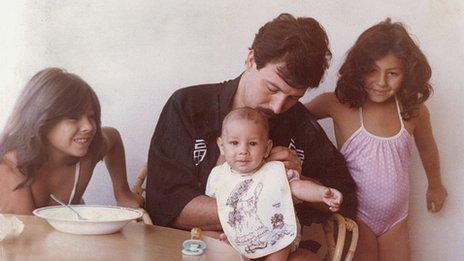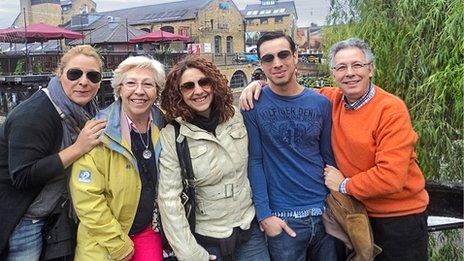How to live with your parents when you are an adult
- Published
Alberto Barragan and his parents describe how mutual respect makes it easy for them to live together
Seventy-three million young adults around the world are young and jobless so many have to live at home in order to get by.
In Spain, where living at home into your 30s is traditional, hundreds of thousands of people have left the country since the financial crisis started in 2008. For those who have stayed in Spain, or even returned from abroad, moving back in with their parents can be a positive, and comfortable option.
Most 25- to 29-year-olds live at home
The typical Spanish home is a noisy, vibrant place.
Honest, fiery debate, often conducted over long meals, is a daily staple of family life.
Most people live in flats, so there is not much personal space.
And unlike in many other developed countries, Spanish children are, normally, not itching to leave.
In fact, living at home well into your 20s, and even into your 30s is common.
The latest government figures show that 55% of 25- to 29-year-olds in Spain, live at home with their parents.
'My parents are my best friends'

Alberto Barragan as a baby, pictured with his family in 1984
Alberto Barragan is 29 and lives at home with his parents in the city of Alcala de Henares, the birthplace of the Spanish author Cervantes. He moved back in after two years working in a restaurant in London.
"I don't have to pay bills and rent, I don't have to cook or make my bed and my parents know me very well, so they know what I like, and what I dislike," he says.
But domestic bliss comes with effort. Alberto's first tip for making it work is respect.
"I have to be patient with them a lot of the time," he says.
"They always worry about what I'm doing, but I understand that, as my parents, they have to worry about me."
Secondly, Alberto says, love makes the whole set-up work.
"My parents are my best friends. If love is in the relationship, everything else doesn't matter. I really love spending time with my parents. If you do not enjoy spending a couple of hours every day with them, you cannot share the same space."
Parents' points

Alberto's family visiting him when he lived in London
Alberto's parents, Lorenzo and Maria also have two tips for making it work.
"When you live with someone you have to accept their defects and virtues," they say. The other thing is to have rules that are respected.
"If there is a lunch on the weekend, everyone has to be there, as it's the only time when the whole family is together."
'History… in reverse!'
Although people in their late 20s and 30s have always lived at home with their parents in Spain, it has become even more common, because of the economic crisis.
"In the past, it was the grandparents who lived with the parents. Now it's the children living with their parents. History has repeated itself, but in reverse!" says Alberto's dad Lorenzo.
In 2008, 70% of people aged between 16 and 29 lived at home with their parents.
In the third quarter of this year, that figure rose to 77%.
Reducing the cost of the crisis
The trend of more young people moving back in with their parents is one example of the role the Spanish family has played during the economic crisis.
"Without family support there would be a lot more suffering in Spain," says Noel Byrne from the Association of Large Spanish Families.
The Irish-born father of nine children believes the strong family support network that exists in Spain has greatly reduced the social cost of the economic crisis.
"I don't think another European country could support the strain and stress caused by the economic downturn here."
In many cases, grandparents are helping out their children and grandchildren.
"So many people are surviving the current situation in Spain, thanks to their family," says Alberto's mum Mari Carmen.
"There are people here who cannot pay their mortgage. And the grandparents are paying it with their pension."